
Getty Images

Audio By Carbonatix
Twelve years after Michael Hancock won the Denver mayor’s race, sixteen people are vying to replace the term-limited politician.
The race comes at a pivotal time for Denver, with unsheltered homelessness spreading across the city and housing becoming increasingly unaffordable. Even so, the Mile High City remains an attractive destination for young people looking to relocate to a place where good jobs are plentiful, the cultural and dining scenes are booming, and the mountains are right nearby. But some residents wonder how long they’ll be able to stay here, given the high cost of living.
While Denverites are ready for Hancock’s departure after three terms, the question of who will replace him in the mayor’s office is a very open one. Recent polling shows that nearly 60 percent of likely voters are undecided, and no single candidate can claim more than 5 percent of the vote.
While it makes the outcome far less predictable, having so many contenders in the race has resulted in some healthy discussions of city issues during endless debates, forums, interviews and stump speeches. One candidate believes he can end homelessness in his first term; another wants to lock up those who refuse help. A handful of candidates want to hire more cops, while others endorse exploring alternatives to traditional policing; yet another brings a jailhouse perspective to the conversation.
Ballots for the municipal election are due at 7 p.m. April 4, but unless one mayoral candidate gets more than 50 percent of the vote, there will be a runoff between the top two vote-getters on June 6.
Here are the current contenders, in alphabetical order, with information from their most recent campaign finance reports on money raised so far (including Fair Elections Fund matches) and questionnaires they filled out for Westword (see the complete answers at westword.com):
Renate Behrens
Originally from Germany, Renate Behrens is running for mayor of Denver with a focus on solving homelessness and fighting age discrimination. She says that she’s worked as a secretary, a chef and a caregiver, and has a background in real estate, property management and construction.
“I am an honest, caring person,” says Behrens, adding that she needs this job because she doesn’t get Social Security and does not have health insurance.
Behrens believes that one of the best ways to get people off the streets of Denver is to transform parking spaces downtown into housing. “These apartments are very simple, yet have electricity, heating, shower and hot plates. Rent has to be paid. If they make it for one year, they get the rent amount back for a fresh start. Employers who have homeless employees should provide housing if needed/wanted,” she adds.
Behrens has raised $429 for her campaign.

Kelly Brough
Evan Semón Photography
Kelly Brough
When describing why she wants to run for mayor of the Mile High City, Kelly Brough uses the word “optimism.”
She’s optimistic about the promise that Denver can offer a city “where working families can buy a home, our downtown is thriving and vibrant, those who are most vulnerable are sheltered and our kids get a great education,” she says.
Brough was able to make good on that promise to her two daughters while raising them in Denver. But her life was tough at times. Her father was murdered when Brough was just an infant, and she lost her husband to suicide following his battle with addiction.
Together with significant experience working in the public sector – as a legislative analyst for Denver City Council, chief of staff for then-Mayor John Hickenlooper, and president and CEO of the Denver Metro Chamber of Commerce – that background has become one of Brough’s primary pitches to Denver voters, to show that she has the professional chops and empathy gained through tough life moments to become an ideal Denver mayor.
But Brough also has a potential weak spot in a city as progressive as Denver. While she was running the Denver Metro Chamber of Commerce, the organization opposed progressive policy proposals in the Colorado Legislature, such as paid family leave. Brough says that she supports paid family leave from a values perspective, but notes that the “devil was in the details” when it came to specific policy items that the chamber opposed.
Brough has promised to stop enforcing the homeless encampment sweeps that became synonymous with the administration of Mayor Michael Hancock.
“Moving people down the block or across the street is a costly, ineffective policy and does not provide meaningful solutions that help individuals or the community. I will provide people experiencing homelessness with a variety of safe indoor options. I have met with nonprofits and organizations that serve the homeless community, and I believe them when they tell me that 90 percent of those who are unhoused would rather be sheltered,” Brough says. However, unlike some more progressive candidates, Brough acknowledges that as a last resort, she would instruct her administration to arrest people who refuse all service offers and continue to camp on the streets of Denver.
“There are a lot of ways that we can ensure it doesn’t criminalize or cause trauma,” Brough notes.
Brough has raised $2,299,249.
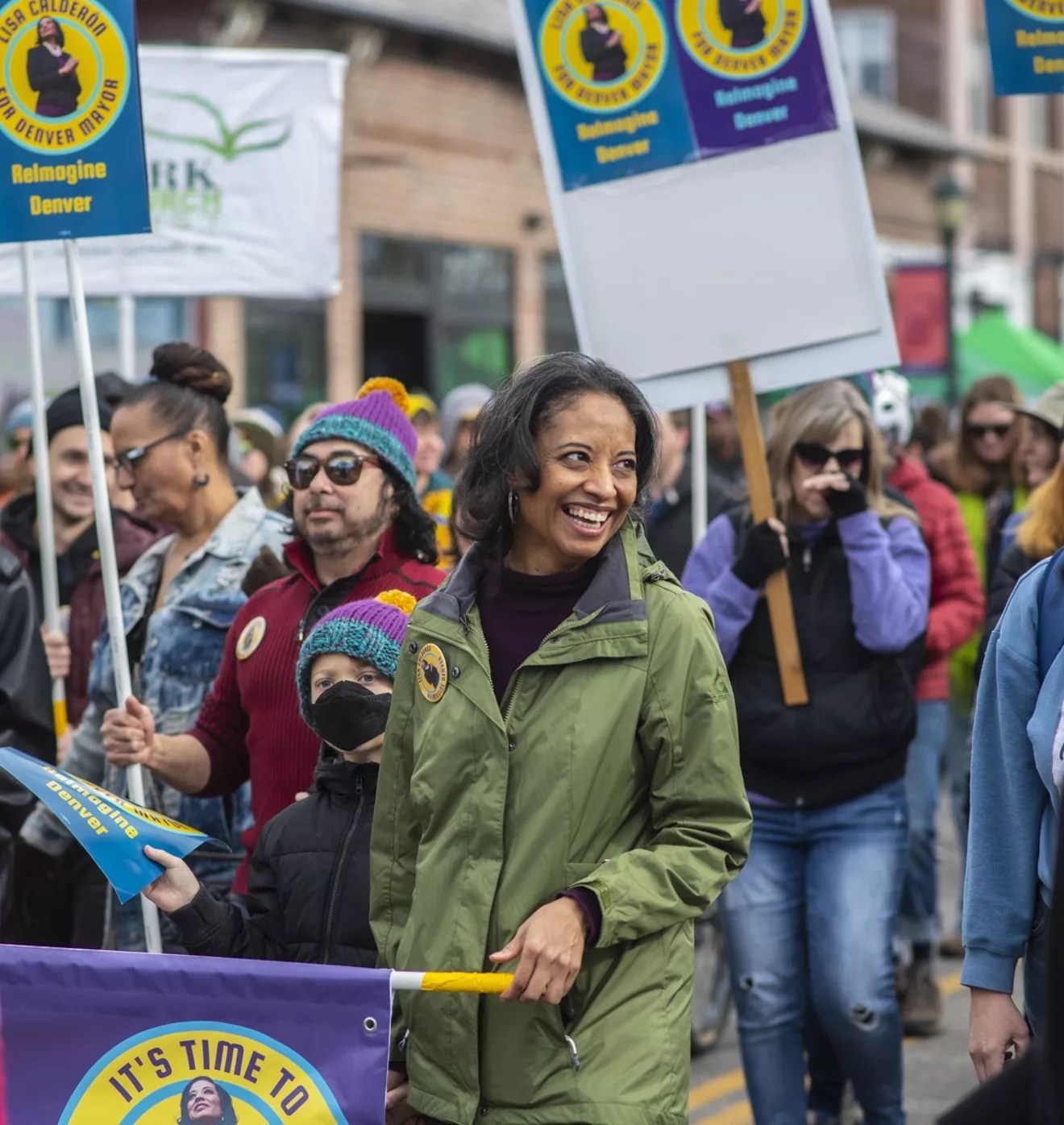
Lisa Calderón
Evan Semón Photography
Lisa Calderón
A lifelong Denverite and a prominent progressive advocate and activist, Lisa Calderón says that now is the time for major changes in how the Mile High City moves forward.
The former head of a community re-entry program for people newly released from jail, she’s also worked as a college professor and as the executive director of Emerge Colorado, an organization that helps Democratic women run for office.
Calderón herself ran for mayor in 2019, placing third in that race, which saw Hancock win a third and final term. She had only a shoestring budget that time; now, with help from the Fair Elections Fund, she’s been able to put on a more polished campaign with more staffers. Despite losing the 2019 mayoral race, Calderón picked up right where she left off once it was over: criticizing Hancock. As a staunch critic of the mayor, Calderón fit in well as chief of staff for Denver City Council rep Candi CdeBaca, another Hancock foe.
She loves dogs and the outdoors; she’s also a huge fan of dark chocolate and “won’t eat the cheap stuff,” she says.
Calderón, who says she plans to end homeless encampment sweeps, would also like to decentralize power in the mayoral administration.
“Unlike other candidates, my administration will distribute power currently held by the mayor’s office and put it back into communities. Denver is better when community members are making decisions for and about their own communities. My platform is driven by a commitment to center marginalized communities and ensure that the residents most typically excluded from political decisions have access to, and input to, how Denver works for them,” Calderón explains.
While Calderón has the backing of plenty of progressives, how well she does in the April race will be a reflection of how far to the left Denver is ready to move. She’s hopeful that with her experience from that first run, a well-organized campaign and a city ostensibly longing for change, she’ll be elected the next mayor of Denver.
Calderón has raised $264,364.
Al Gardner
An IT executive by trade, Al Gardner has worked in the nonprofit, startup and public sectors. But it’s his time on various boards and commissions, particularly as chair of the Denver Citizen Oversight Board, that give him a unique insight into how law enforcement works in Denver. Gardner led the board that watched over the Denver police and sheriff departments when they were revising hiring, training and disciplinary processes; that board also worked closely with the Independent Monitor, the chief law enforcement watchdog in Denver.
“Service to the community is the cornerstone of who I am and who I will be as Denver’s mayor. I will focus my efforts on creating ladders of success and crafting common-sense changes to policies that improve the lives of Denver citizens,” says Gardner, who plays the tuba, drums and trombone.
Gardner would also like to increase the police budget to invest in police recruiting.
“Having worked closely with DPD, I am keenly familiar with the struggles to recruit good candidates and fully staff all of our districts and adequately cover all shifts,” he says. “Understaffed shifts and overwhelmed officers have led to long 911 wait times that impact citizen safety.”
Gardner has raised $13,770.
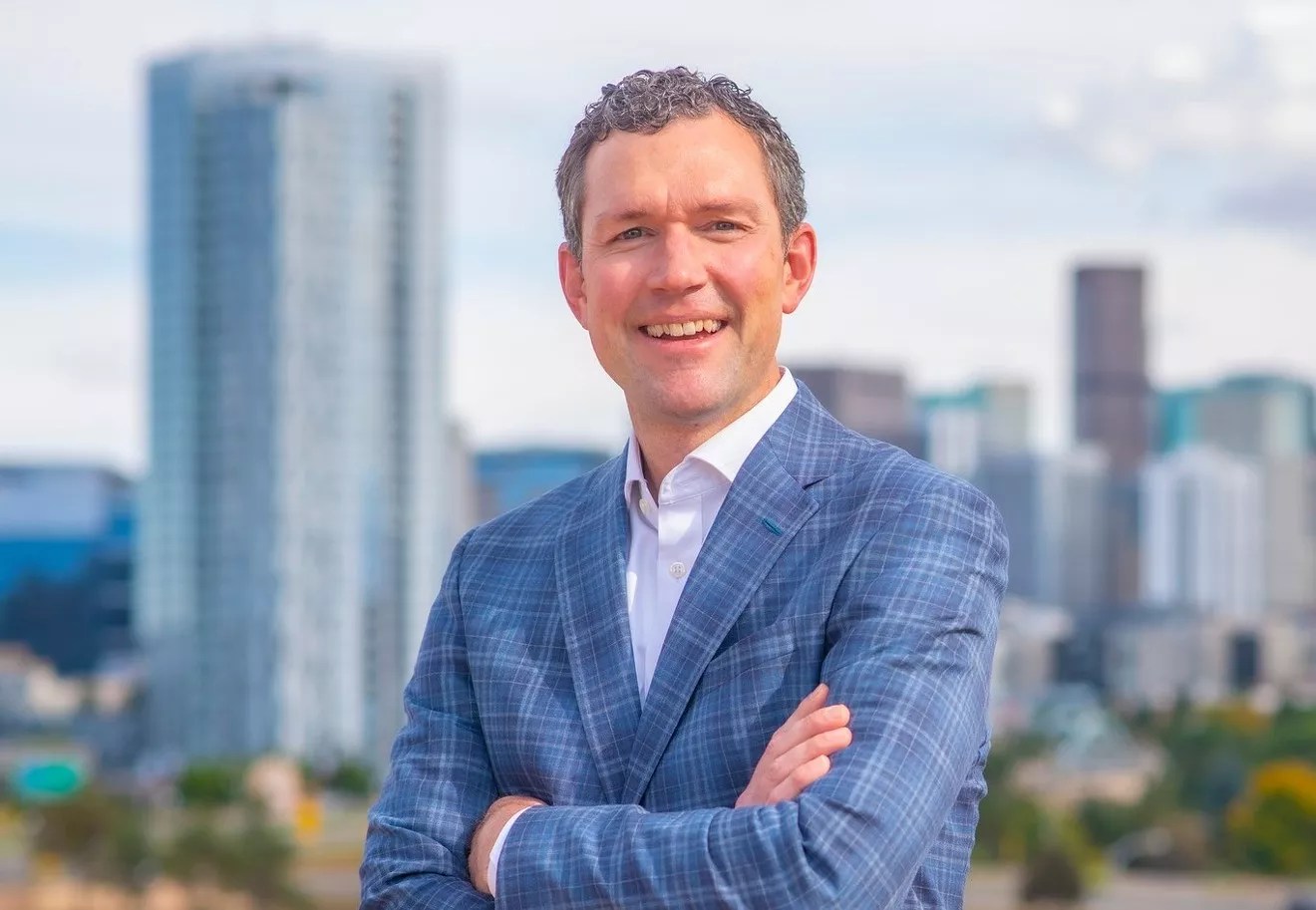
Chris Hansen
Chris Hansen for Mayor
Chris Hansen
Although he grew up in Goodland, Kansas, just across the border from Colorado, Chris Hansen says that he and his family rooted for the Broncos and read the Denver Post.
After studying engineering at Kansas State University, Hansen got degrees from MIT and Oxford. He’s put his education to work in the renewable energy and electricity fields, as well as the financial sector.
Over the past seven years, Hansen has represented Denver in the Colorado Legislature, where he currently serves as a state senator. Now this lover of musical theater and former member of his college glee club wants to take all of his experience in the public and private sectors to become Denver’s next chief executive. As mayor, Hansen says, he would make Denver the greenest city in America.
“I plan to add EV chargers, renegotiate with Xcel to protect customers and electrify our transit and heating and cooling systems,” he explains. “I’ll collaborate with Denver Water to promote water efficiency programs and reduce water waste. Through the lens of environmental justice, I’ll address disproportionate pollution in low-income areas. The city must lead the plan to develop transit options along key corridors with dense housing.”
He’s also taking a tough stance on unsheltered homelessness, using the subject as material for a television ad and promising to enforce the camping ban.
“Folks living in encampments are in inherently dangerous situations, and I want to help the unhoused quickly and efficiently access services they need, including stable housing and wraparound services like mental health and substance-use treatment,” Hansen says.
Hansen has raised $575,862.
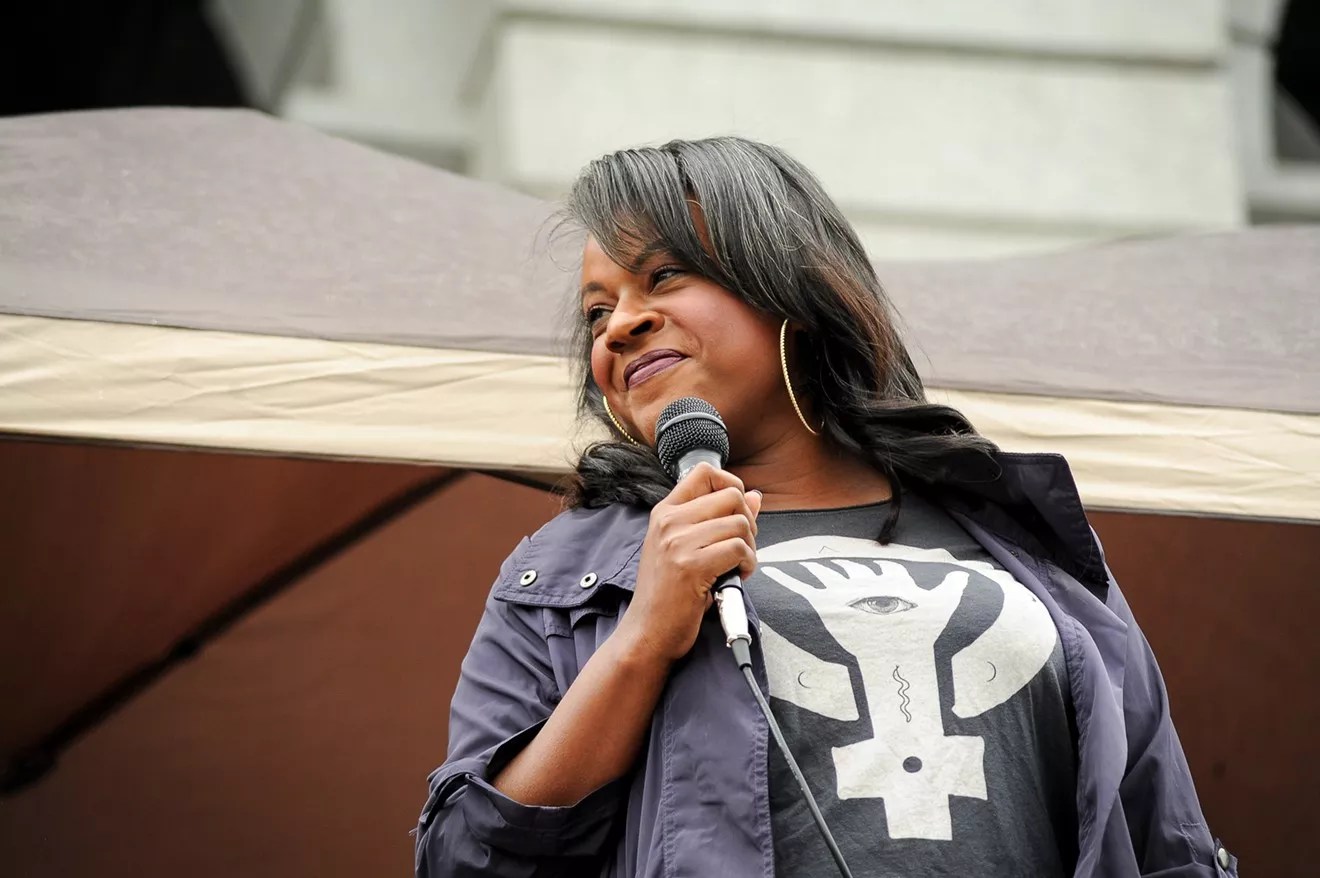
Leslie Herod
Erin McCarley
Leslie Herod
A resident of Colorado for over twenty years, Leslie Herod has served in the Colorado House of Representatives since 2016 as a Democrat representing Denver.
Herod, the first LGBTQ Black individual to serve in an elected office in Colorado, is well known for her work on criminal-justice reform. In the summer of 2020, as protesters were demanding racial justice in the streets of Denver, Herod spearheaded a police accountability proposal known as SB-217, which passed out of the legislature and was signed into law that same year.
Herod had already brought forward the Caring for Denver measure, which Denver voters approved in 2018. The measure raised the city sales tax, with extra revenue earmarked for mental health programs. Some of that money now funds the Support Team Assisted Response (STAR) program, which sends a paramedic and a mental health clinician to crisis situations that don’t merit a law enforcement response. Herod, who notes that she’s more introverted than most people assume, is now hoping that the skills she honed in the legislature will carry her into the mayor’s office.
As mayor, Herod would invest more in resources to get people living on the streets indoors.
“Bold action is required to change the trajectory of the city, and we can develop solutions that are both safe and caring,” Herod says. “Eighty to 90 percent of unsheltered people would rather be in housing, and it costs $200 to $500 per day to house someone in the Denver jail. Denver voters don’t want to continue with failed policies of the past. We must develop a new response that includes comprehensive housing and safety programs.”
Herod has raised $1,087,303.
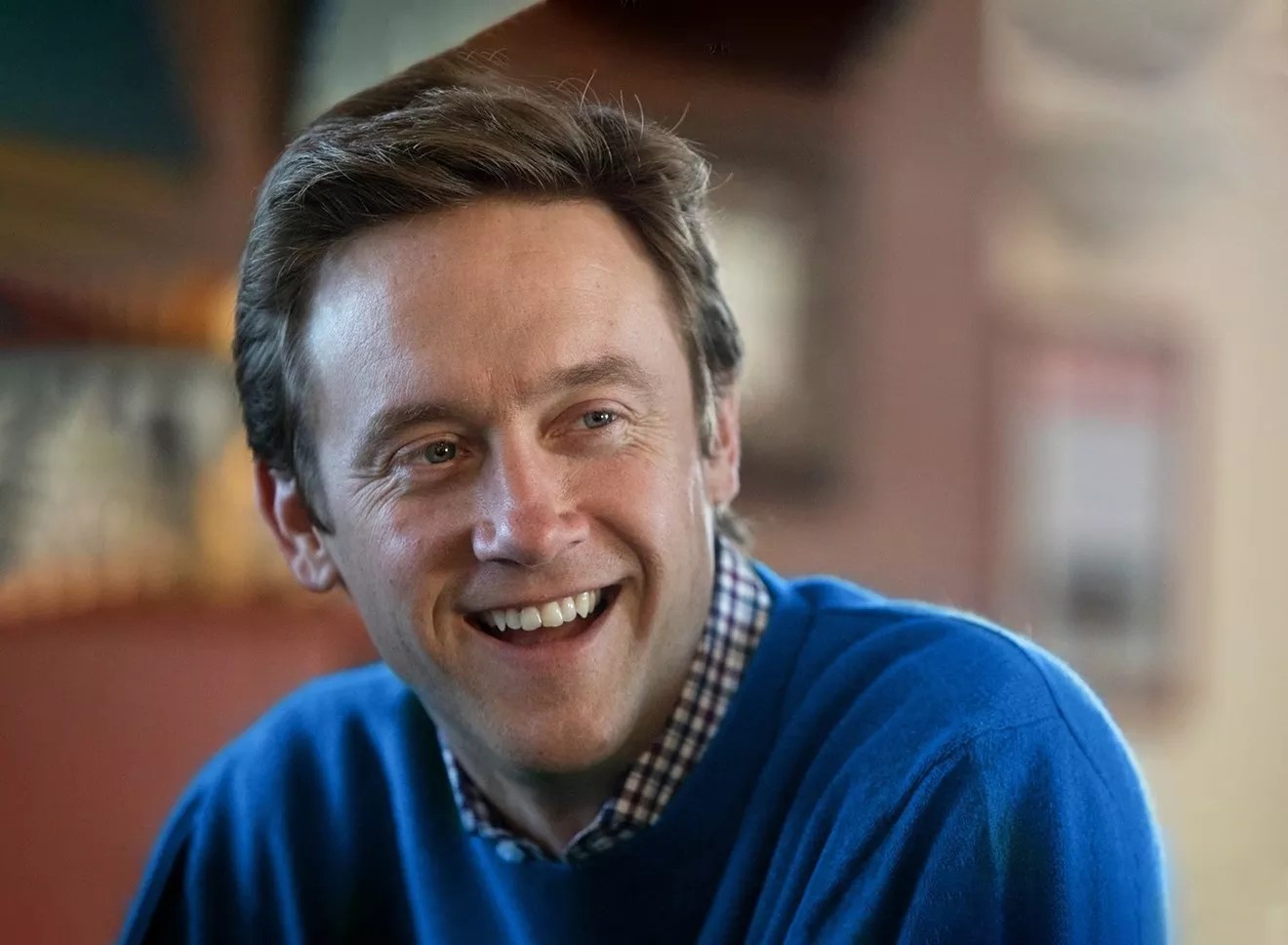
Mike Johnston
Mike Johnston for Mayor
Mike Johnston
A Colorado native and resident of Denver for the past twenty years, Mike Johnston has spent his career in education, the nonprofit world and politics, specifically as a Colorado state senator representing northeast Denver.
In his most recent gig, as CEO of Gary Community Ventures, Johnston spearheaded the passage of Proposition 123, a statewide measure that aims to raise around $300 million per year for affordable housing in Colorado. And that falls in line with Johnston’s major campaign focuses: housing, and ending homelessness in his first term as mayor.
To achieve that goal, Johnston says he’d build 1,400 tiny homes or hotel conversions in ten to twenty microcommunities that have wraparound services.
These microcommunities would “create a sense of community by moving people who live together in encampments into the same microcommunities and offer a diverse array of microcommunities to meet individual needs” and also “stop eviction and displacement by investing in prevention to reduce the number of residents who become homeless,” Johnston contends. That way, Johnston could still “lead compassionate enforcement of the camping ban for those who are unwilling or unable to move into microcommunities.”
Johnston made unsuccessful runs at both a U.S. Senate seat and the Colorado governor’s office. The former Yale soccer player and state champion ski racer is hoping that this time around, he’ll be able to win the most powerful political office in Colorado: Denver mayor.
Johnston has raised $2,572,347.
Aurelio Martinez
Aurelio Martinez, a graduate of Manual High School, has a diverse range of experiences that he’d bring to the Denver mayor’s office. He’s run the concessions at City Park Golf Course; he also owned and operated Don Carlos Mexican Restaurant. Since retiring in 2020, Martinez has done volunteer advocacy work in the Curtis Park neighborhood, where he lives.
While he’s not the only former athlete in the mayoral field, he’s the most accomplished: He competed as a boxer at both the amateur and professional levels for ten years.
And as mayor, Martinez plans to give more power to neighborhoods.
“We will put together an Office of Ombudsman and Liaison that will be the bonding of residents and the city administration to ensure neighborhoods are in control,” Martinez says.
Martinez has raised $49,384.
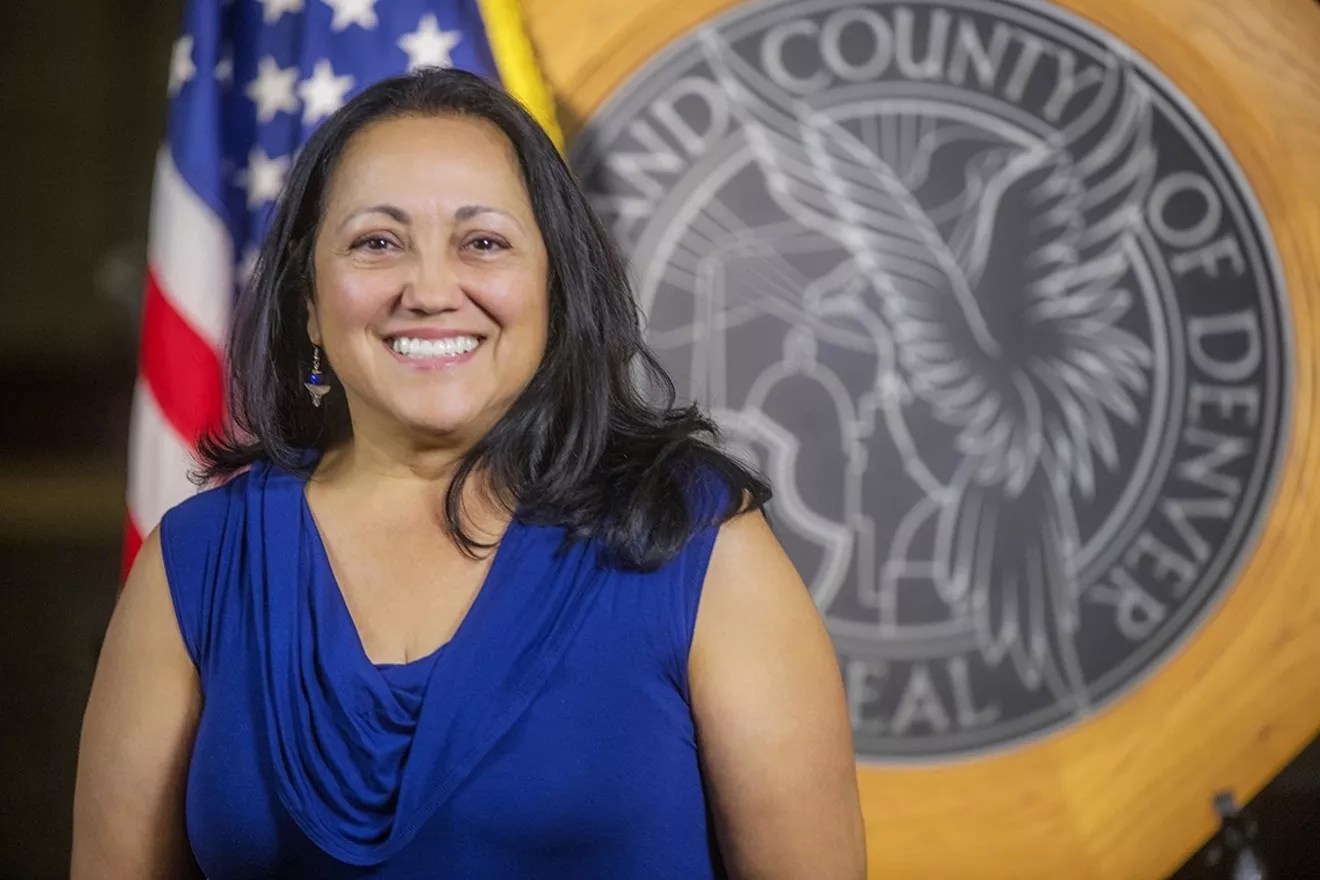
Debbie Ortega
City of Denver
Debbie Ortega
No mayoral candidate has had a longer career in politics than Debbie Ortega. A district councilwoman from 1987 to 2003 and then an at-large member of Denver City Council from 2011 through today, Ortega worked with Denver’s Road Home on the issue of homelessness between her council stints.
And before Ortega was first elected to office, she worked for a lieutenant governor, a U.S. senator and a Denver City Council member.
As some of her biggest political achievements, Ortega cites her work pushing a cleanup of environmental waste in Globeville and Elyria-Swansea, as well as her efforts to bring preservationists and property owners in LoDo together to stave off inappropriate development. In her free time, Ortega loves to make jewelry; she says she gives away all of her favorite pieces.
Ortega won’t have much free time if she’s elected mayor. Although Denver may be in the mood for change after twelve years of the same administration, Ortega views her own lengthy political experience as a strength. And she believes Denver needs to get more focused on certain types of crimes.
“I’ll start by standing up a metro task force focused on stopping the supply of lethal drugs and guns in our community while cracking down on car, bike and catalytic converter theft,” Ortega says, adding, “We must also invest in recruitment, retention and training to stem the loss of personnel in public safety departments and increase neighborhood safety.”
Ortega has raised $524,288.
Terrance Roberts
A Park Hill native and a former member of the Bloods gang, Terrance Roberts ended up turning his life around in prison, ultimately becoming an anti-gang activist.
But his work in anti-gang advocacy took a hit when Roberts shot someone at a 2013 peace rally that he’d organized. He was ultimately acquitted of attempted murder; in recent years, Roberts, who is a vegetarian for moral and health reasons, has continued his advocacy work in both the racial justice and criminal justice reform worlds. He’s running for mayor on a platform of establishing a public bank in Denver and tackling poverty to get at the root causes of many of the problems with which Denver is grappling, such as homelessness and crime.
“My platform calls for more public social housing with on-site services and a public banking system to pay for it. Nobody is moving from a tent into what is being considered ‘affordable housing.’ After more newly built or retrofitted public social housing, then more attainable low-income housing is needed, and then someone can transition to what is being considered affordable housing,” Roberts says.
He also believes that Denver should stagger its let-out time in LoDo to prevent the type of violence that has become so characteristic in the area when bars and clubs are closing for the night. “I am actually the only candidate that has expressed this is needed since I announced my platform,” Roberts says. “Studies show it’s safer for our unhoused population, law enforcement, DUI arrest and accidents, and will add revenue to our general fund from additional sales tax dollars and tourism dollars.”
Roberts has raised $100,390.
Trinidad Rodriguez
A born-and-raised West Denverite who’s the son of former Denver City Council rep Rosemary Rodriguez, Trinidad Rodriguez has spent his professional career straddling the worlds of finance, policy and politics.
Rodriguez spent three years as a policy advisor for Governor Roy Romer. He’s also chaired the boards of the Denver Housing Authority and the Downtown Denver Partnership.
And while he’s more recently worked as an investment banker, Rodriguez was once a bike courier in Denver. There are other unusual occupations on his bucket list, including trying his hand at being a sushi chef and an adobe brick maker. But before he takes on those gigs, Rodriguez would like to serve as Denver mayor.
As mayor, Rodriguez would adopt a tough stance toward homelessness, and that includes placing hundreds of people living on the streets in a “field hospital” that he’d create.
“As the scale and nature of the challenge evolve, it is clear that we need to do something different as well, particularly for people living and dying unhoused on our streets while grappling with mental health and substance misuse disorders. I will continue to sweep unauthorized encampments under the unauthorized camping ban to ensure health and safety for all,” Rodriguez says. “I will declare an emergency. I will work to provide treatment-resistant folks who are unhoused and pose a threat to themselves or others with treatment under voluntary and involuntary bases.”
Rodriguez has raised $183,410.
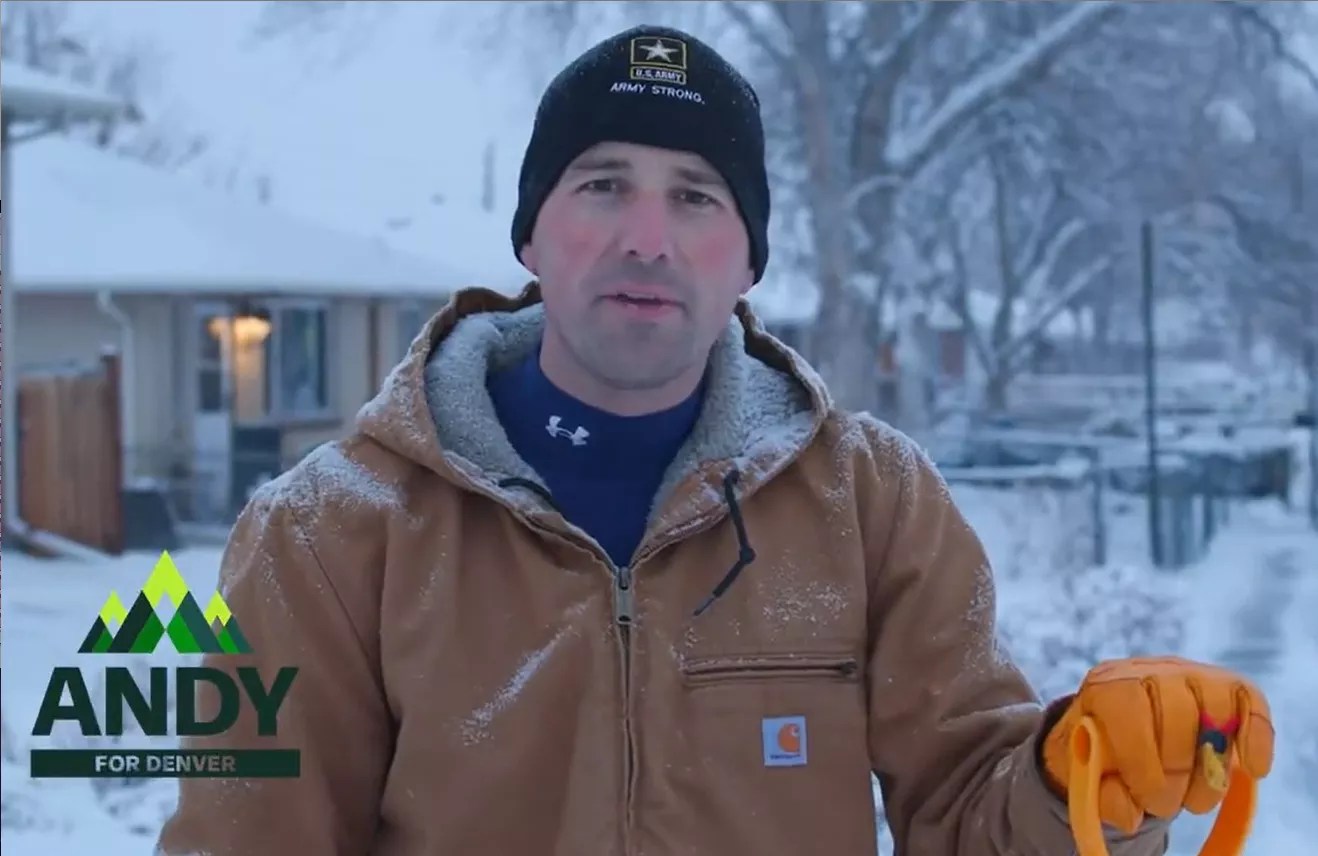
Andy Rougeot
Andy for Mayor
Andy Rougeot
Republican Richard Batterton served as Denver mayor from 1959 to 1963; no member of the GOP has served as the Mile High City’s chief executive since then. Andy Rougeot, who showed his eagerness to improve the city by shoveling people’s sidewalks and walkways this winter, wants to buck that trend.
A former U.S. Army officer who deployed to Afghanistan, Rougeot moved to Colorado in 2011, ultimately settling with his now-wife in Denver in 2013. In addition to his military experience, Rougeot has business experience: He’s run his own company fixing gates for self-storage units. He is also the son of the CEO of Sephora Americas.
Rougeot, who has a ninety-pound golden retriever named Bandit and two young daughters, is running a largely self-funded, tough-on-crime campaign with a strict policy regarding unsheltered homelessness. As the lone registered Republican in the race, he’s banking on a belief that Denver voters have gotten fed up enough with crime and homelessness to start leaning toward the right.
“As mayor, I will make Denver safer by adding 400 police officers and eliminating 911 hold times. I will reduce homelessness through the aggressive enforcement of the camping ban to get unsheltered homeless into mental health and drug addiction services. Finally, I’ll increase the affordability of housing for first-time homebuyers, young families and blue-collar workers by fixing our broken planning department and eliminating costly regulations that unnecessarily increase the cost of housing,” Rougeot says.
Rougeot has raised $806,215, mostly through self-funding
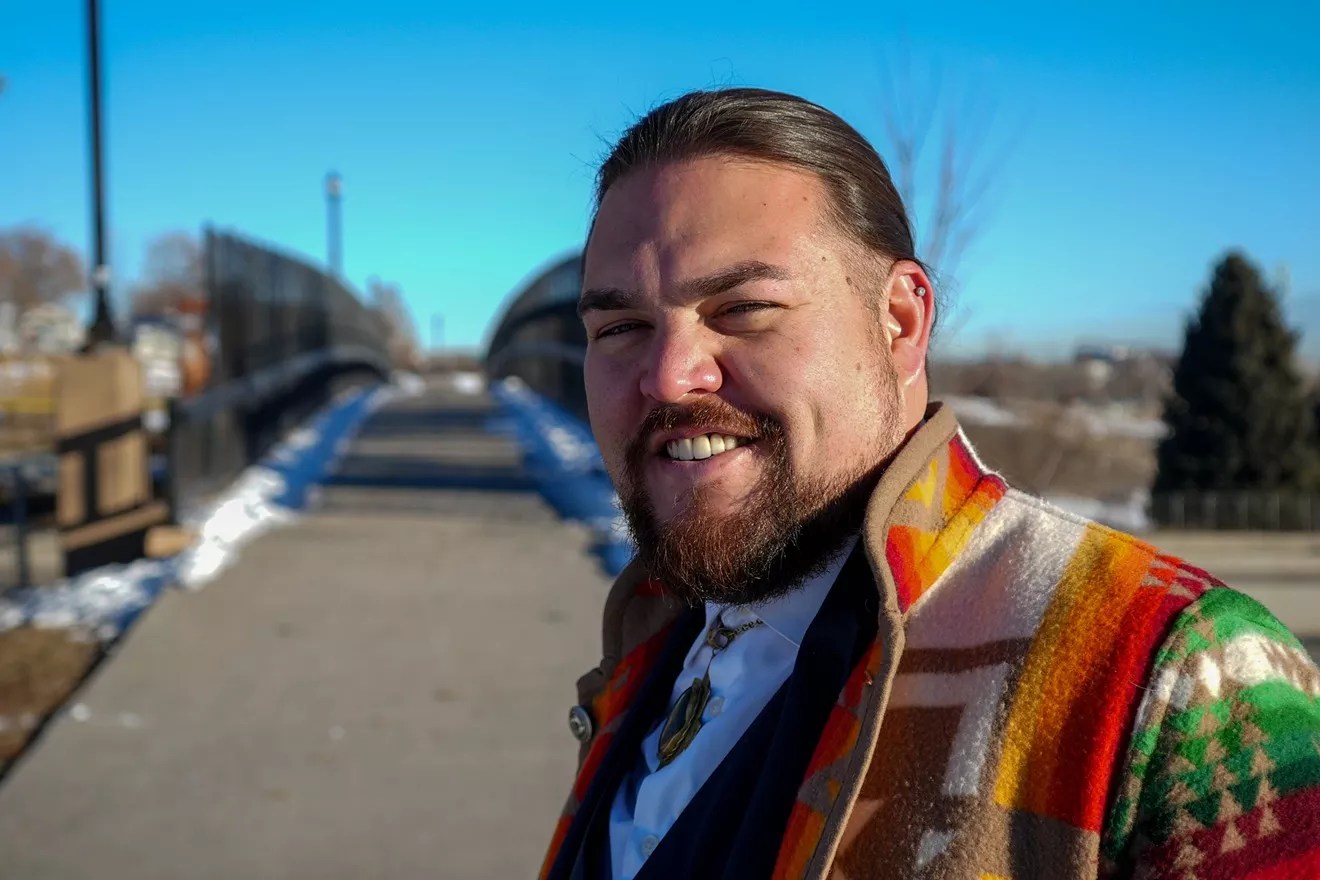
Ean Tafoya
Ean Tafoya for Mayor
Ean Tafoya
If there’s an important environmental or climate issue in Colorado, count on Ean Tafoya to be involved. As the state director for GreenLatinos, Tafoya is a well-known advocate around town, fighting against polluters and extractive companies. And he spearheaded the Waste No More measure that passed last November, which requires businesses to provide composting and recycling services in Denver.
Tafoya, a born-and-raised Denverite who has served as a host on KGNU Community Radio, has also been heavily involved in neighborhood organization advocacy, especially in relation to local plans and zoning policies.
In 2015, Tafoya, who’d worked for Denver City Council, ran against Albus Brooks in the council race for District 9, which Brooks won easily, only to lose his seat in 2019 to Candi CdeBaca. Through it all, Tafoya’s expertise and reputation have continued to grow.
Tafoya would end the camping ban and also go after green initiatives for Denver. He’d also like to focus on helping Denver’s most marginalized find housing.
“We need increased requirements and incentives for building units that are actually affordable for those communities, allow commercial zoning to become residential and ease permitting so people can build on single-family homes to fit more people,” Tafoya says. “All this housing construction is a huge opportunity for that construction to be sustainable. It’s also an opportunity to invest in local workforce development and contract with local businesses with the highest labor standards.”
Tafoya has raised $203,269.
Robert Treta
Robert Treta thinks that if the Mile High City got better at building housing, it would ameliorate many of the issues facing Denver. Treta, a builder himself, would bring his expertise to the mayor’s office, helping enable the construction of thousands of units. This would get people off the streets, and the city’s other challenges would be more solvable as a result, he contends.
“I am running for mayor of Denver to build 7,000 attached, tandem, 16-by-16-foot cubicle dwellings at the cost of $25,000 per unit, complete with private bathrooms and kitchens. This is entry-level housing that no Denverite will ever fall below. The homeless crisis is a direct result of failed policies and failed acknowledgment of affordable housing in Denver. As a 27-year builder in the city of Denver, I have seen many mistakes. Denver needs to get in front of and ahead of its problems before they reach crisis proportions,” Treta says.
Aside from his time in the building business, Treta has worked as an English-language teacher and lived in both Mexico and Japan. He drives electric vehicles that are solar-powered, and has built green-energy homes that are powered by solar.
“I will incentivize solar and electric vehicle charging stations throughout the city using cost-effective technologies,” he adds. “We need to add to our electrical infrastructure on as many rooftops as we can. The EV revolution is fully on its way, and not only is Denver not ready, but Denver is way behind,” Treta adds.
Treta has raised $125.
James Walsh
A political science teacher at the University of Colorado Denver, James Walsh has called Colorado home since 1990. Eighteen years ago, the former college wrestler founded the Romero Theater Troupe, a volunteer-run community theater program that Walsh notes “uses the stage to educate the public about non-traditional history and stories about human rights struggles.”
Walsh is running one of the most progressive campaigns in the Denver mayoral race, as he talks with compassion about people experiencing homelessness and those on the margins of society.
He may not have the best shot at winning, but he certainly does offer intriguing ideas. In particular, Walsh wants to enact a Universal Basic Income across Denver to help get people out of poverty.
“Universal Basic Income allows some unhoused people to immediately qualify for a small apartment,” Walsh says. He also wants the city to expand its affordable-housing stock through a streamlined system that gets people into permanent, dignified housing as quickly as possible. This includes purchasing and recycling aging hotels around the city, investing in social housing on a massive scale, and providing incentives and education around limited equity housing cooperatives.”
Walsh has raised $70,890.
Thomas Wolf
A resident of Cherry Creek, Thomas Wolf says he’d bring the perspective of a political outsider and a financial professional’s quantitative acumen to the mayor’s office. But while Wolf has worked in investment banking for over two decades, his life has taken him on other paths, too.
Born in Iowa, Wolf has worked in construction, carpentry and general contracting. While in college, he even thought he’d become a doctor and took a surgery research class that found him retrieving organs for future transplants. And now, after a long career in finance in both the U.S. and Europe, Wolf is able to switch quickly between local politics talk and financial and economic jargon.
“To have somebody with numbers competency is of desperate need right now,” says Wolf, who ran for mayor in 2011, too. But he also believes that the city needs someone who can focus on the homeless issue. And that’s Wolf’s major campaign platform issue.
“We basically need to have a truce with encampments and explain to them, it is a new day in Denver, and Mayor Wolf has directed social workers backed up by police officers to deliver the message: You will need to vacate your encampment,” he says. “We can provide you shelter in city buildings or land. If you refuse to vacate, you will be arrested and charged with all of the laws you are breaking. If you vacate but only relocate, you will be arrested and charged with all of the laws you are breaking. The only endpoint is when the last encampment has been provided shelter.”
Wolf has raised $126,814.
Click to see the complete questionnaire answers from Kelly Brough, Thomas Wolf, Lisa Calderón, Andy Rougeot, Ean Tafoya, Renate Behrens, Debbie Ortega, James Walsh, Robert Treta, Leslie Herod, Chris Hansen, Mike Johnston, Trinidad Rodriguez, Aurelio Martinez, Terrance Roberts and Al Gardner.